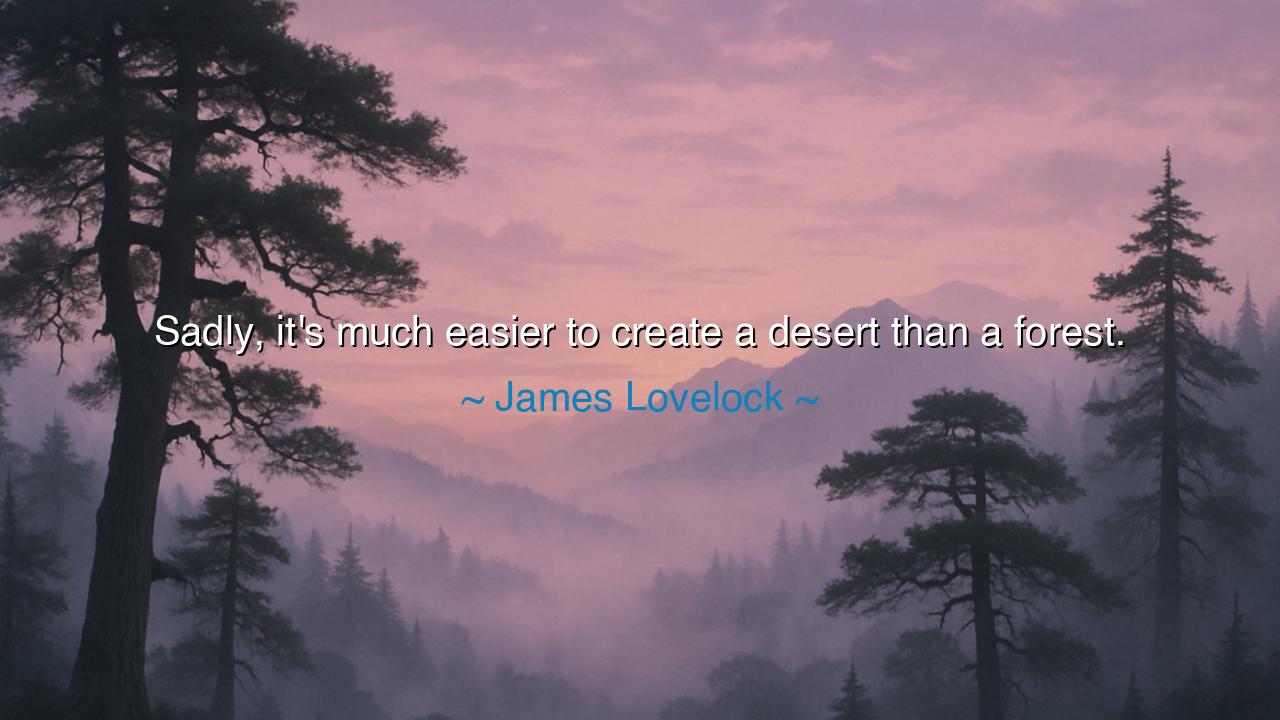
Sadly, it's much easier to create a desert than a forest.






When James Lovelock, the great prophet of the Earth, spoke the words, “Sadly, it’s much easier to create a desert than a forest,” he uttered a truth that echoes through the ages like the cry of a dying world. His words are not merely about soil and trees—they are a lament for the fragility of creation, and a warning to humankind about the power of destruction that lies within its grasp. For the forest, lush and teeming with life, takes centuries to grow, nourished by harmony, patience, and balance. But the desert, dry and lifeless, can be made in a single generation—through greed, neglect, or ignorance.
This quote is born from Lovelock’s deep understanding of the living Earth, what he called Gaia—the self-sustaining organism that breathes through oceans, forests, and winds. To him, the Earth was not merely a planet, but a great and ancient being, whose health depends on the care of all her children. And yet, in our blindness, we have turned our backs upon her. We cut the trees, drain the rivers, and poison the air—and in doing so, we turn the living world into dust. The forest is an act of love; the desert, an act of carelessness.
In ancient times, the land of Mesopotamia—cradle of civilization—was once rich with fields and rivers. The Tigris and Euphrates flowed through gardens so fertile that the ancients called it Eden. But through centuries of overuse, the soil turned to salt, the forests vanished, and the once-green lands became barren. The people sought to master the earth, and instead, they broke her. Thus was Lovelock’s truth written long before he was born: it is easy to destroy what nature builds slowly, for destruction is swift, but creation requires devotion.
To create a forest, one must wait, tend, and protect. It is an act of faith, for the one who plants the seed may not live to see its shadow. The forest is patient, humble, and generous—it gives shelter, food, and breath to all. But to create a desert, one needs only to take without giving, to clear without replanting, to consume without reverence. The hands that neglect, the hearts that forget, are the architects of desolation.
Yet this saying is not only about the natural world—it is about the spirit of humankind. For within each person, too, there lies a forest and a desert. The forest grows when we nurture wisdom, kindness, and curiosity. It flourishes when we act with compassion and gratitude. But when we give way to greed, apathy, or cruelty, the inner soil dries. The rivers of empathy fade. The once-living soul becomes barren. It is easier to destroy our inner world than to cultivate it; easier to give in to bitterness than to grow in love.
In the modern age, we see this lesson again and again. The Amazon rainforest, the lungs of the Earth, burns for profit, while deserts spread where once rivers sang. The soil, stripped of its guardians, cries out for renewal. But even in despair, there is hope—for where the hand of destruction has passed, the hand of healing may yet follow. Across the world, reforestation movements rise; people plant trees, restore wetlands, and revive the land. In the same way, souls once scorched by neglect can be healed through care, patience, and reverence.
The lesson of Lovelock’s words is therefore this: it takes little to destroy, but it takes greatness to create. To build, to nurture, to protect—these are acts of courage. Each tree planted, each kindness shown, each act of preservation is a victory against the desert’s advance.
So let us become keepers of the forest, both of the Earth and of the soul. Let our hands sow life where others bring ruin; let our hearts remain fertile with hope. Remember always: to create a desert is easy, but to grow a forest—within ourselves and upon the Earth—is the noblest labor of humankind. For only those who tend to life, patiently and faithfully, can ensure that the world remains green for those who will walk it after us.






AAdministratorAdministrator
Welcome, honored guests. Please leave a comment, we will respond soon